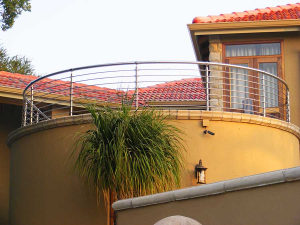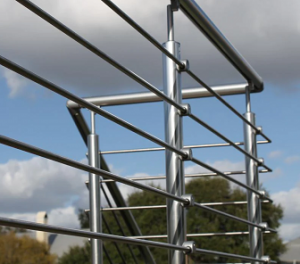Seamless Integration: Elevating Architecture with Stainless Steel Railings
In the world of modern architecture, the marriage of form and function has become an art. One prime example of this harmonious integration is the fusion of stainless steel railings with other architectural elements. Stainless steel railings are not only utilitarian safety features but also design statements that can seamlessly blend with various surroundings, enhancing both aesthetics and functionality.

1. Balancing Aesthetics and Purpose
Stainless steel railings have transcended their functional roots to become an integral part of the overall architectural narrative. Their sleek, metallic elegance complements a wide range of design styles, from minimalist to industrial, contemporary to classical. By integrating stainless steel railings with other elements like glass, wood, or stone, architects can strike a balance between safety and visual appeal.
2. Harmonizing with Surroundings
Whether it’s an urban skyscraper or a coastal residence, stainless steel railings possess the adaptability to harmonize with their surroundings. When combined with glass panels, they offer unobstructed views, effectively blending indoor and outdoor spaces. In coastal areas, stainless steel’s corrosion resistance makes it a perfect choice, ensuring longevity even in harsh environments.
3. Enhancing Transparency
In open-concept designs, stainless steel railings can provide a sense of transparency. When paired with glass or cable infills, they create an illusion of spaciousness while maintaining safety. This integration is popular in modern residential designs, giving a feeling of continuity between different levels or spaces.
 4. Texture and Contrast
4. Texture and Contrast
Contrast is a powerful tool in architecture, and stainless steel railings can create stunning visual contrasts. When placed against a backdrop of natural materials like wood or stone, the smooth and reflective nature of stainless steel generates a captivating interplay of textures. This contrast highlights the distinct features of each material, adding depth to the overall design.
5. Sculptural Artistry
Stainless steel railings can be more than just barriers; they can be sculptures in their own right. When integrated with unique designs or intricate patterns, they become artistic focal points within a space. These railings not only serve their primary purpose but also contribute to the overall aesthetic, making a bold statement about the architectural intent.
6. Cohesive Interior-Exterior Flow
For residences and commercial spaces, maintaining a cohesive flow between indoor and outdoor areas is essential. Stainless steel railings can create a seamless transition between these spaces. By using the same railing design both indoors and outdoors, architects achieve a sense of unity that connects different areas of a building.
7. Integration with Lighting
Lighting plays a crucial role in architecture, and stainless steel railings can enhance this aspect. Incorporating LED lighting elements into the railing system can create ambient illumination along pathways, staircases, or balconies. This integration not only enhances safety but also transforms the railings into luminous design elements after sunset.
Integrating stainless steel railings with other architectural elements has become a hallmark of innovative design. The versatility of stainless steel allows architects and designers to explore new realms of creativity while maintaining the primary function of safety. By seamlessly weaving these railings into the fabric of the built environment, architects are not only shaping spaces but also elevating them to new heights of elegance and sophistication. The future of architecture lies in the seamless integration of functional elements that enhance the visual experience, and stainless steel railings are leading the way.

 +86 159 6420 9667
+86 159 6420 9667  sales@haxrailing.com
sales@haxrailing.com 



